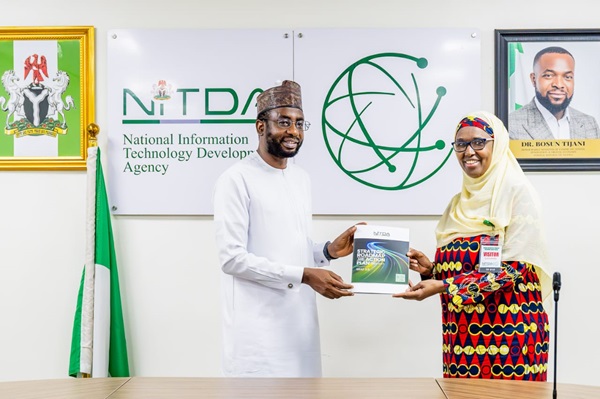
As part of its ongoing effort to enhance education, health and social investment through digital innovation, the National Information Technology Development Agency (NITDA) is set to collaborate with the Africa Centre of Excellence for Population Health and Policy (ACEPHAP).
This announcement came during a visit by a delegation from ACEPHAP, led by its director, Prof. Hadiza Galadanci to NITDA’s corporate headquarters to discuss potential collaboration areas.
Director-general of NITDA, Mallam Kashifu Abdullahi emphasised that technology is a crucial enabler across all critical sectors in Nigeria, particularly healthcare. “Healthcare is key to us, and the President is also big and loud on it. We have crafted our strategic roadmap and action plan, which includes eight pillars to achieve significant milestones in the sector,” he stated.
Abdullahi outlined NITDA’s Strategic Roadmap and Action Plan (SRAP 2.0), which aims to create a thriving digital ecosystem benefiting all sectors. He highlighted the first pillar, which focuses on fostering digital literacy and cultivating talent, aiming for 95 per cent digital literacy by 2030, with a mid-term target of 70 per cent by 2027. The agency’s “Digital Literacy for All” programme aims to infuse digital skills into the national academic curriculum in collaboration with the Ministry of Education. Additionally, plans are underway to train 3 million Nigerians in high-demand IT skills through various initiatives, including partnerships with platforms like Coursera.
“We aim to increase the digital fluency of our citizens. Everyone should be able to use digital devices safely and responsibly and build our proficiency to enhance our digital offerings in the country,” Abdullahi added.
Abdullahi also shared insights on various strategic initiatives that the agency has been implementing, which visitors can leverage to create a vibrant healthcare sector. These initiatives align with other SRAP pillars: building a robust technology research ecosystem, strengthening policy implementation and legal frameworks, promoting inclusive access to digital infrastructure and services, enhancing cybersecurity and digital trust, nurturing an innovative and entrepreneurial ecosystem, forging strategic partnerships, and cultivating a vibrant organisational culture and agile workforce within NITDA.
The agency is investing in research on six emerging technologies: AI, IoT, Robotics, UAVs, blockchain, and additive manufacturing. Abdullahi mentioned the goal of establishing centres of excellence in geopolitical zones to foster innovation and collaboration. “Based on that, we would do the site readiness assessment for the equipment you need, and you can do it for any or all of the identified emerging technologies with your focus on healthcare,” he stated.
In emphasising the importance of patient data privacy, Inuwa asserted, “Cybersecurity is critical to whatever you do because even the patients need to be sure of the integrity, availability and confidentiality of their information. As you digitise, you need to make sure their data is secure.”
He also disclosed that through the Nigeria Startup Act, NITDA has been supporting startups with incentives and resources to foster innovation. The agency encourages startups to register and benefit from these initiatives to boost their growth and scalability. Speaking on forging strategic partnerships and collaborations, he mentioned that the agency engages with academia, corporate organisations, entrepreneurs, venture capitalists and government entities to build a cohesive innovation ecosystem.
Abdullahi added that this multi-stakeholder approach ensures diverse perspectives and resources contribute to Nigeria’s digital transformation. He also mentioned recent collaborations, such as with e-Health Africa, which uses AI tools like ChatGPT to enhance medical research and diagnostics. This innovative approach is part of a broader strategy to develop local AI-driven solutions that can transform healthcare delivery in Nigeria.
In her remarks, Galadanci expressed optimism about the future and envisioned a long-lasting relationship with NITDA that will drive transformative change in the healthcare sector. Highlighting the center’s focus on healthcare entrepreneurship and innovation, she shared success stories from their healthcare entrepreneurship boot camp and pitching event in 2023, where young innovators in Kano were supported with seed grants to further develop their ideas.
She noted that the collaboration would translate research into impactful policies and foster a culture of innovation and entrepreneurship among students, faculty and healthcare professionals. “We sincerely hope this will be the beginning of a long-lasting relationship and partnership that will translate to the true meaning of the quadruple helix in the quest to address healthcare challenges through technology, innovation and entrepreneurship in Nigeria and Africa,” she remarked.
The collaboration between NITDA and ACEPHAP marks a significant step towards leveraging digital technology to improve healthcare delivery in Nigeria. By integrating technological innovations and fostering a culture of continuous improvement and innovation, this partnership aims to bridge gaps in healthcare access and enhance the overall quality of healthcare services across the country.


